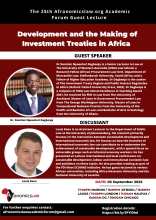In Search of a Suitable Theoretical Justification for Patent Rights
The book is a must-read for policymakers, governments, regional communities, students, researchers, health practitioners and anyone that may be interested in 'the access to medicine for all' campaign. The depth of analysis and critical thinking renders the author's arguments very persuasive and practical. It will stimulate the readers to view patent law and policy as a ‘work in progress’ rather than being ‘cast in stone’ and get them thinking about how it can be further improved. The book is highly recommended.
